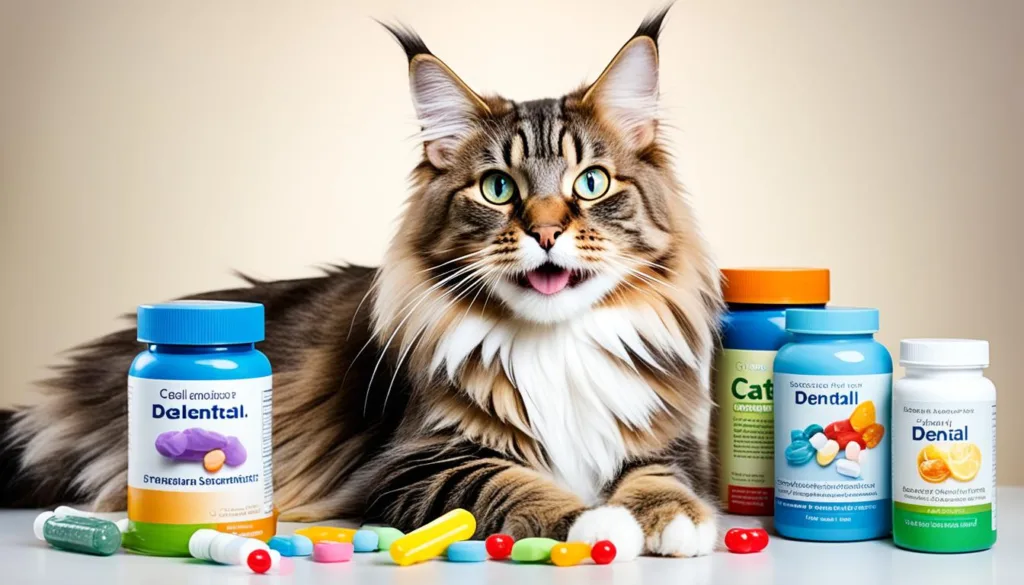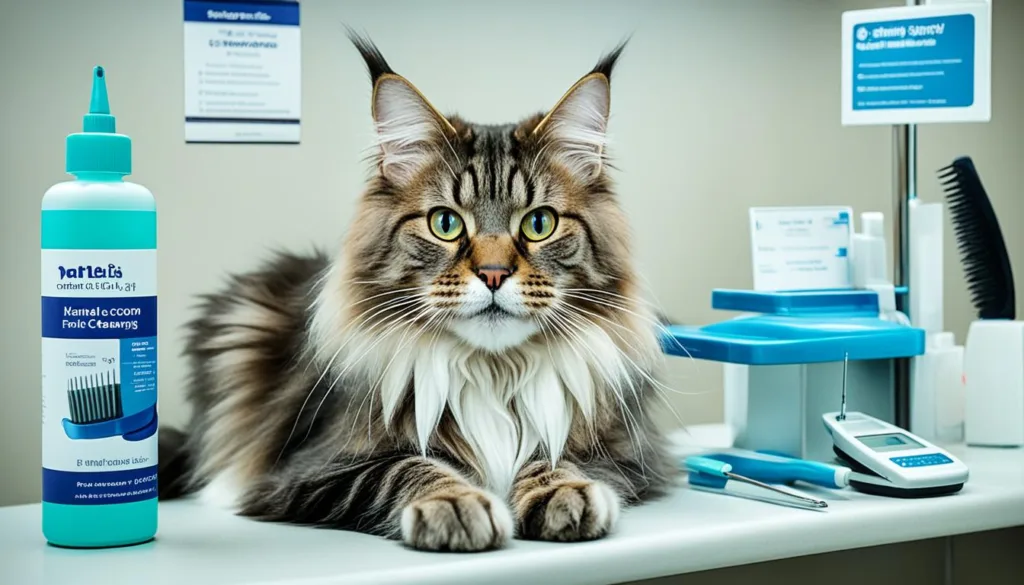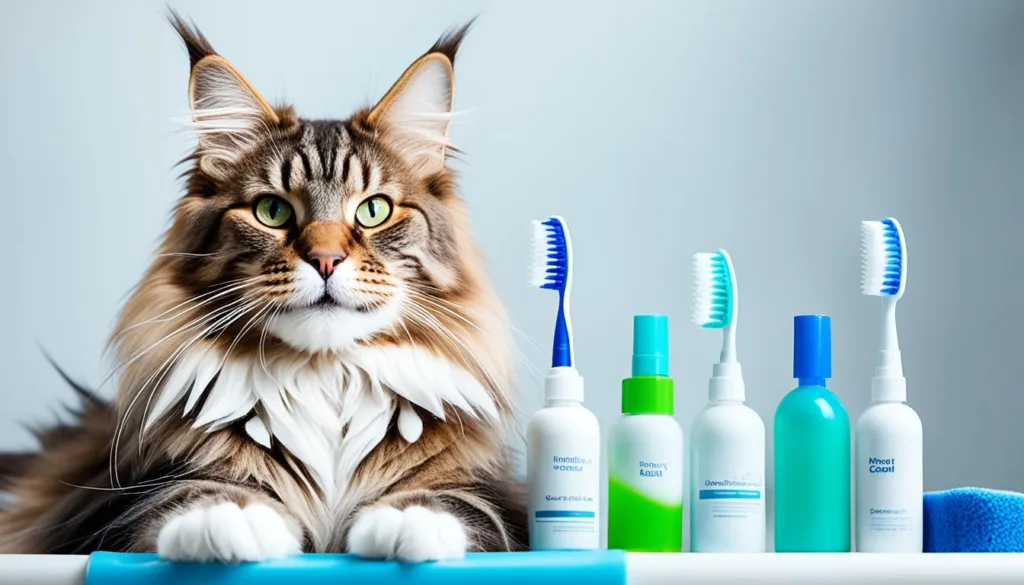Dental health is key for Maine Coons’ overall well-being. Regular care like brushing, professional cleanings, and prevention can stop common dental issues. This article will guide you on keeping your Maine Coon’s mouth healthy for a long time.
Key Takeaways
- 50-90% of cats get periodontal disease by age four, showing why early care is vital.
- Brushing your cat’s teeth daily from a young age can greatly lower dental problem risks.
- Regular vet check-ups and cleanings are key for keeping an eye on your Maine Coon’s oral health.
- Feeding them right and giving dental-friendly treats can help make their teeth and gums stronger.
- Acting early with brushing and plaque control can stop serious health issues linked to dental disease.
Importance of Oral Health for Maine Coons
Keeping your Maine Coon’s mouth healthy is key to their overall health. Dental problems can cause a lot of pain, infection, and make eating hard. This can really lower the quality of life for these big cats. Issues like plaque, tartar, gingivitis, and abscesses are common in Maine Coons.
Impact on Overall Well-being
Poor dental health can affect Maine Coons in many ways. It can make eating painful and lead to weight loss and malnutrition. It can also weaken their immune system. If not treated, dental problems might even cause heart and kidney disease.
Common Dental Problems in Maine Coons
- Plaque Buildup: Sticky deposits of bacteria, food, and saliva that can harden into tartar if not removed regularly.
- Tartar Accumulation: Hardened plaque that adheres to the teeth, leading to gum inflammation and periodontal disease.
- Gingivitis: Inflammation of the gums, characterized by redness, swelling, and bleeding.
- Dental Abscesses: Pockets of infection that can form at the base of a tooth, causing pain and potentially spreading to other areas.
It’s important to deal with dental issues quickly to avoid bigger problems. Regular vet visits, good home dental care, and a balanced diet help keep your Maine Coon’s mouth healthy and happy.
Dental Health in Maine Coons
Keeping the teeth of Maine Coon cats healthy is key to their overall health. These big cats often face dental problems, like periodontal disease, which is the main reason for tooth loss in cats. Gingivitis, or gum inflammation, can turn into serious periodontal disease if not treated, leading to tooth loss.
It’s vital to take Maine Coons for regular dental check-ups and cleanings. They also face health issues like hip dysplasia, hypertrophic cardiomyopathy, and blood clots. Cats that are overweight are more likely to have dental problems. So, keeping them at a healthy weight through exercise is crucial.
| Dental Health Challenges for Maine Coons | Preventive Measures |
|---|---|
| Periodontal disease | Regular dental checkups and cleanings |
| Gingivitis | Proper dental hygiene and brushing techniques |
| Tooth loss | Maintaining a healthy weight and physical activity |
Drinking enough water is key for dental health in cats, as not enough water can cause drooling, which might mean dental problems. Catching and treating small issues early can stop them from getting worse, keeping these cats healthy and happy.
Maine Coons are one of the most popular cat breeds, known since the 19th century. They have unique looks and personalities. Taking good care of their teeth is important to keep them healthy and happy with their owners for many years.
Brushing Techniques for Maine Coons
Keeping your Maine Coon’s teeth clean is key to their health. Regular tooth brushing is a great way to do this. Using the right tools and techniques makes it easier for you and your cat.
Proper Brushing Methods
When brushing your Maine Coon’s teeth, use soft, circular motions. Angle the bristles towards the gumline to remove plaque and tartar. Start by letting your cat get used to the toothbrush slowly.
Make brushing a habit by doing it two to three times a week. This helps keep your cat’s teeth healthy.
Tools for Effective Tooth Brushing
- Soft-bristled toothbrushes made for cats are comfy and efficient.
- Finger brushes offer better control and precision, perfect for reaching every part of your Maine Coon’s mouth.
- Dental wipes or gauze pads are great for gently cleaning your cat’s teeth and gums.
Regular Maine Coon tooth brushing is vital. It keeps your cat’s mouth healthy and happy. Using feline dental care techniques and cat oral hygiene tools helps a lot.
“Prevention is emphasized over treatment in maintaining oral health for Maine Coon kittens and cats.”
Dietary Considerations for Oral Health
The Maine Coon’s diet is key to their dental health. Crunchy kibble helps by reducing plaque and tartar. Wet food and sugary treats can lead to dental issues. It’s important to know how nutrition affects their oral hygiene for their health.
Maine Coon cats have long, silky fur that needs daily brushing to avoid mats and hairballs. They also need regular tooth brushing to keep their mouths healthy. These big cats can live up to 15 years or more. A balanced diet is key for their health.
Dry kibble made for dental health cuts down on tartar and gingivitis in cats. Cats are meat-eaters, so their teeth are made for tearing meat. Crunchy kibble is better at removing plaque. Wet food can help with kidney health by making cats drink more water, but it doesn’t help with dental health.
| Diet Type | Impact on Dental Health | Impact on Kidney Health |
|---|---|---|
| Dry Kibble | Significantly reduces tartar and gingivitis | No significant impact |
| Wet Food | Does not contribute to improved oral hygiene | May benefit by increasing water intake |
Not all cat foods are the same, even if they’re dry kibble. Look for Maine Coon diet and dental health, feline dental care nutrition, and cat oral hygiene and food products approved by the Veterinary Oral Health Council (VOHC). These products help reduce plaque.
“Periodontal disease is the most common problem affecting cats of all age groups. Plaque is the root cause of periodontal disease in cats.”
Knowing how diet affects your Maine Coon’s oral health helps you support their long-term health and well-being.
Professional Dental Care for Maine Coons
Regular vet checkups and cleanings are key for your Maine Coon’s dental health. Your vet can spot and fix dental issues during these visits. They can also teach you how to care for your cat’s teeth at home.
Know the signs of dental problems, like bad breath, trouble eating, and swollen gums. This way, you can get help quickly.
Regular Checkups and Cleaning
Maine Coons often face dental issues, like stomatitis. A study in 1997 showed that 60% of cats with stomatitis got better with full mouth extractions. Getting your cat’s teeth cleaned by a pro every 6-12 months can prevent these problems.
Feline juvenile gingivitis mainly hits breeds like Maine Coons, Ragdolls, and Siamese. It might not show up until your cat is 12-24 months old. So, it’s key to have your Maine Coon’s teeth checked often by a vet.
Signs of Dental Issues to Watch For
- Bad breath
- Difficulty eating or reluctance to eat
- Excessive drooling
- Gum inflammation or redness
- Visible tartar buildup on the teeth
If you see any of these cat dental problem signs, get vet help fast. Catching and treating dental issues early can stop bigger problems. It keeps your cat healthy and happy.
Home Remedies and Supplements
Regular brushing and professional cleanings are key for Maine Coon dental health. But, you can also use home remedies and supplements to help. These natural options can cut down on plaque and tartar, keeping your cat’s mouth clean between vet visits.
Dental Wipes and Water Additives
Dental wipes made just for cats are easy to use to clean your Maine Coon’s teeth and gums. They have gentle ingredients that remove food bits and freshen breath. Adding special water additives to your cat’s water can also boost dental health. These additives have enzymes or antiseptic qualities.
Dental Treats and Chews
Feeding your Maine Coon dental treats and chews can be fun and helpful for their teeth. These items are made to remove plaque and tartar as your cat chews. Make sure to pick ones without added sugars or preservatives.
| Home Remedy | Benefits |
|---|---|
| Dental Wipes | Gentle cleaning, freshen breath |
| Water Additives | Enzymatic or antiseptic properties |
| Dental Treats | Scrape away plaque and tartar |
Using Maine Coon dental health home remedies, feline dental care supplements, and cat oral hygiene natural solutions can keep your cat’s teeth healthy between vet visits.

“Keeping your Maine Coon’s teeth clean is key for their health. Home remedies and supplements are great for their oral care between vet visits.”
Environmental Factors Affecting Dental Health
We must think about more than just our Maine Coon’s diet and dental care. Their living space matters too. The water they drink affects their oral health and dental care.
Water Quality and Fluoride Levels
The water’s quality and fluoride levels can boost or harm your Maine Coon’s dental health. Make sure they have clean water with the right amount of fluoride. Fluoride makes teeth strong and helps prevent cavities and gum disease.
On the other hand, bad water or too little fluoride can lead to dental issues. Check your local water’s fluoride levels. If it’s low, consider adding fluoride to keep your cat’s mouth healthy and strong.
| Factors | Positive Impact | Negative Impact |
|---|---|---|
| Water Quality | Clean, filtered water supports overall health | Contaminants can contribute to dental issues |
| Fluoride Levels | Appropriate fluoride strengthens tooth enamel | Insufficient fluoride increases risk of cavities |
By giving your Maine Coon clean, fluoridated water, you can prevent dental problems. This helps keep their mouth healthy and boosts their overall health.
Preventative Measures for Kittens
Starting good dental habits early is key for Maine Coon kittens’ oral health. These cats often get gum problems like gingivitis and stomatitis. Regular brushing, dental-friendly foods, and vet check-ups can prevent these issues. This helps your Maine Coon have healthy teeth and gums for life.
Gingivitis is common in cats, affecting many, including Maine Coons. Stomatitis affects about 2% of Maine Coons and can come from viruses or genes. Catching these problems early means quicker vet help, reducing risks.
Products from the Veterinary Oral Health Council (VOHC) help keep Maine Coon kittens’ mouths clean. First-year vet visits are crucial for health checks and shots. Maine Coon kittens need special food because they’re big and active.
| Preventative Measure | Benefit |
|---|---|
| Regular Brushing | Reduces plaque and tartar buildup, preventing gingivitis and periodontitis. |
| Dental-Friendly Diet | Promotes healthy teeth and gums through appropriate nutrition. |
| Routine Vet Checkups | Allows for early detection and treatment of dental issues. |
By doing these things, Maine Coon kitten owners can keep their pets’ mouths healthy and happy for years.
Costs and Resources for Maine Coon Dental Care
Looking after your Maine Coon’s dental health has costs, but knowing what you might spend helps you care for your cat well. Regular vet visits, cleanings, and treatments for their teeth can add up. But, it’s key to spend on their dental care for their overall health.
Experts say buying a purebred Maine Coon cat from a good breeder costs between $1,000 to $2,000. Dental care costs can change based on your cat’s needs. Some things that affect the cost include:
- Regular dental check-ups and cleanings, which can range from $100 to $500 per visit
- Treatments for dental issues, such as extractions or periodontal disease, which can cost hundreds or even thousands of dollars
- The purchase of dental-specific food, treats, and grooming tools to maintain oral hygiene at home
To keep dental care costs down, look into pet insurance that covers dental services. Also, find vet clinics that focus on feline oral health. Plus, doing dental care at home, like brushing teeth and giving dental treats, can prevent costly problems later.

Knowing the costs and using resources helps you give your Maine Coon the dental care they need. With good planning and caring for their teeth, you can keep your cat healthy and happy for years.
Conclusion
Keeping your Maine Coon cat’s teeth healthy is key. By brushing regularly, feeding them right, and seeing the vet often, you can keep their teeth strong. This is good for their overall health and happiness.
Using dental treats, chew toys, and regular vet visits helps prevent dental problems. Catching dental issues early can make your cat more comfortable. It also helps them live a longer, happier life.
Being proactive about your Maine Coon’s dental health keeps them happy and healthy. Adding Maine Coon dental health, feline oral hygiene, and cat dental care summary to your routine is a smart move. It ensures your Maine Coon stays healthy for many years.
FAQ
What are the common dental problems faced by Maine Coons?
How can I maintain my Maine Coon’s dental health?
What are the proper techniques for brushing a Maine Coon’s teeth?
How can diet impact a Maine Coon’s dental health?
When should I take my Maine Coon for a professional dental cleaning?
What are some home remedies and supplements that can support my Maine Coon’s dental health?
How can environmental factors affect my Maine Coon’s dental health?
What are the preventative measures I should take for my Maine Coon kitten’s dental health?
What are the potential costs associated with maintaining my Maine Coon’s dental health?
Source Links
- 5 Effective Ways To Care For Your Cat’s Oral and Dental Health
- How to care for your Cats teeth and gums | Talynnkingcoons

